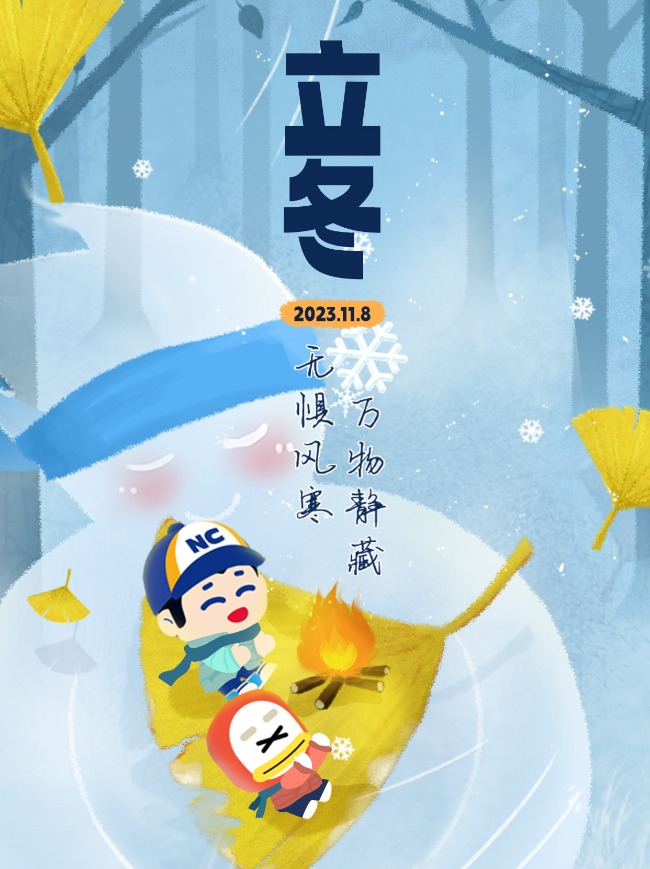一、“立冬”用英语怎么说?
立冬是冬季的第一个节气,也是中国传统二十四节气(the 24 traditional Chinese solar terms)中的第十九个节气。
Start of Winter, or Lidong in Chinese, is the 19th of China's 24 solar terms and the first for the winter.
立冬为什么叫“Start of Winter”,而不是“Beginning of Winter”。
有一种解释是这样的,start和beginning是近义词,但start “has the sense of being a fixed point in time(指时间上某个固定的点)”,而beginning “could possibly refer to any time between the start and the halfway point(可以指从起点到中点之间的任何时间)”。
立冬通常在每年阳历11月7日或8日,它是二十四节气中的第十九个、冬季的第一个节气。“立”建始也,冬季自此开始;“冬”终也,万物收藏也——动物穴藏,规避寒冷;秋收作物,收库入仓;人类也开始“藏”起来。
The Beginning of Winter, or Lidong in Chinese is usually marked on November 7 or 8. It is the 19th solar term of the 24 Solar Terms, and the first solar term in winter. Li, the beginning of winter, and Dong, the end of the year, send everyone into hiding — animals hibernate to avoid coldness; autumn crops are harvested and stored; and even humans find their ways to hiding.
第一“藏”:保暖。立冬过后,冷空气活动日渐频繁,气温骤降,此时养生重在保暖。中医认为,寒为阴邪,侵伤阳气。所以要注重保暖,不可贪凉,适当晚起,保证睡眠,有助于阳气潜藏。
The first is hiding from cold. As cold winds sweep and temperatures drop sharply after Lidong, the focus of health preservation at this time is to keep warm. According to traditional Chinese medicine cold is harmful to one’s Yangqi or life energy in English. Therefore, special attention should be paid to keeping warm. People can don multiple layers or choose to stay in bed late to nurture their Yangqi.
第二“藏”:食补。天寒地冻,驱寒食物,常备家中。中国南方,人们会食用滋阴补阳、热量较高的食物,如鸡鸭鱼肉等。The second is hiding from illness. Foods that drive away cold should be stocked in the kitchen. In the southern part of China, people tend to eat high-caloried foods, such as chicken, duck, fish, and so on.

二、立冬就代表着入冬?
In ancient times, the Chinese people took the Start of Winter to be the beginning of the winter. However in fact, the Start of Winter is not the beginning of winter in terms of meteorology. The climate every year is different, so the beginning of winter could be quite different. And with the vast territory of China, winter of every area doesn’t begin at the same time.
在古代,中国人把立冬当作冬天的开始。然而事实上,从气象学的角度来看,冬天的开始并不都是立冬。每年的气候都不一样,所以冬天的开始可能会很不一样。而且中国幅员辽阔,各地的冬天并不是同时开始的。
三、立冬三候
Water begins to freeze – the initial stages of water bodies freezing over.
一候水始冰:水面初凝,未至于坚也。
The earth begins to harden.
二候地始冻:土气凝寒,未至于坼。
Pheasants enter the water for clams.
三候雉入大水为蜃。
四、立冬习俗
立冬有哪些习俗呢?一起来看看吧。
迎冬仪式
Welcoming the winter
立冬与立春、立夏、立秋一同并称为“四立”,古时皇帝会在立冬这天出郊“迎冬”。《吕氏春秋》中也有相关记载:“立冬之日,天子亲率三公九卿大夫以迎冬于北郊。”
The beginnings of the four seasons were important festivals in ancient times. Before the Start of Winter, the ancient emperor would take a shower and have no more meat. On that day, the emperor would lead his officials to the suburbs and perform the ceremony of "welcoming the winter".
古时,“四立”都是重要的节日。立冬之前,帝王会沐浴斋戒,到了节日当天,将率领百官到郊外举行迎冬仪式。
吃饺子
Eating dumplings
A legend has it that at the end of the Eastern Han Dynasty (AD25-220), "Medical Saint" Zhang Zhongjing saved many people in Henan province from a typhoid epidemic and their ears’ from being frostbitten around Start of Winter.
传说在东汉末年(公元25-220年),“医圣”张仲景救了许多河南人,让他们免于流行伤寒,帮助他们在初冬时耳朵免于冻伤。
He cooked mutton, hot peppers and herbs to dispel the cold and warm up the body. He wrapped these ingredients into a dough skin and made them into an ear shape. Since then, people have learned to make the food which became known as "dumpling" or jiaozi. Today there is still a saying that goes "Eat dumplings on Start of Winter Day, or your ears will be frostbitten."
张仲景用羊肉、辣椒和草药煮熟来祛寒暖身。他把这些材料包在面皮里,做成耳朵的形状。自那以后,人们就学会了“饺子”的做法。如今,民间还流传着“立冬不端饺子碗,冻掉耳朵没人管”的俗语。
养冬
"Nourishing the winter"
On the first day of Start of Winter, there is a custom, "nourishing the winter", in Southeast China in places such as Fujian, Guangdong and Taiwan provinces. To prepare for the oncoming cold winter, people there like to eat high-calorie food such as chicken, duck, beef, mutton, and fish, which are usually stewed with the four Chinese medicines: angelica, ligusticum wallichii, Chinese herbaceous peony and rehmannia glutinosa libosch, to enhance the effectiveness of the nourishment.
在立冬的第一天,在中国东南部的福建、广东和台湾等省份有一个习俗,叫“养冬”。为了应对即将到来的寒冷冬天,那里的人们喜欢吃高热量的食物,如鸡、鸭、牛肉、羊肉和鱼,这些食物通常与当归、川芎、芍药、地黄四味中药一起炖,以提高营养的功效。
吃南瓜
Eating Chinese pumpkins
南瓜耐存放,是不少家庭的冬储菜品。在天津,人们会在立冬第一天吃南瓜馅的饺子。
It is a common vegetable in North China. Generally, the pumpkins are bought in the summer and stored until the Start of Winter.
南瓜是中国北方常见的蔬菜,人们通常会在夏天买南瓜,然后储存起来,等到立冬再拿出来吃。
吃团子
Eating tuanzi in Wuxi
On the first day of Start of Winter, people in Wuxi have a custom of eating tuanzi, a kind of traditional Chinese food made with rice. At this time, the autumn grain crops have just been sold on the market, and the tuanzi made by the newly-harvested crops tastes delicious. Most rural residents make tuanzi by themselves, while urban residents buy ready-made tuanzi. The tuanzi stuffing can be sweet bean paste, radish or lard。
在立冬的第一天,无锡人有吃团子的习俗,团子是一种用大米做成的中国传统食物。此时,秋粮刚刚上市销售,新收获的作物做的团子味道鲜美。大多数农村居民自己制作团子,而城市居民购买现成的团子。团子馅可以是豆沙、萝卜或猪肉。
祭祖
Offering sacrifices to ancestors
The Start of Winter, when the autumn crops have been placed in storage, was the time of the festival for the people of the Manchu Eight Banners and Han Eight Banners in Benxi of Liaoning province. Incense was burned and sacrifices offered to ancestors. The Eight Banners (baqi) were administrative/military divisions during the Qing Dynasty (1644-1911).
“立冬”表示秋粮已入库,这个季节就是辽宁本溪当地满族八旗和汉八旗人家烧香祭祖的节日。八旗制度是中国清代(公元1644-1911年)的行政以及军事制度。
五、“立冬”相关英文句子
Start of Spring, Start of Summer, Start of Autumn and Start of Winter show the starts of the four seasons.
立春、立夏、立秋、立冬则反映了四季的开始。
It becomes colder and colder when winter comes.
立冬了,天越来越冷。
It is not particularly uncommon for Hangzhou to have thunderstorm after "Lidong"( one of Chinese solar terms meaning the beginning of winter).
“立冬”过后出现雷雨,也不算特别少见。
六、“立冬”相关英文词汇
1.freeze
vi. 冻结;冷冻;僵硬 n. 冻结;凝固;
例句:
If the temperature drops below 0°C, water freezes.
如果气温降到零度以下,水就会结冰。
When we freeze water, it turns into ice.
当我们冷冻水的时候,水变成冰。
freeze的引申义就是“严寒”,这时它有两种形式:freezing和frozen。
2.chill
寒冷的;冷漠的
例句:
Walking home in the snow, we got chilled to the bone.
我们蹚着雪往家走,快要冻僵了。
3.frosty
结霜的,严寒的;冷淡的;灰白的
例句:
It was a cold and frosty morning.
这是一个天寒地冻的早晨。
4.icy
冰冷的;冷淡的;结满冰的
例句:
She opened the window and I was hit by an icy blast of air.
她打开窗户,一阵冷风向我袭来。
5.frigid
寒冷的,严寒的, 冷淡的
例句:
Frigid winds blew from the north.
寒风从北方吹来。
6.parky.
(天气、空气)寒冷的
解析:
例句:
It's a bit parky outside today.
今天外面有点冷。
冬天要到啦,温馨提示:睡前泡脚,有助于入眠哦。